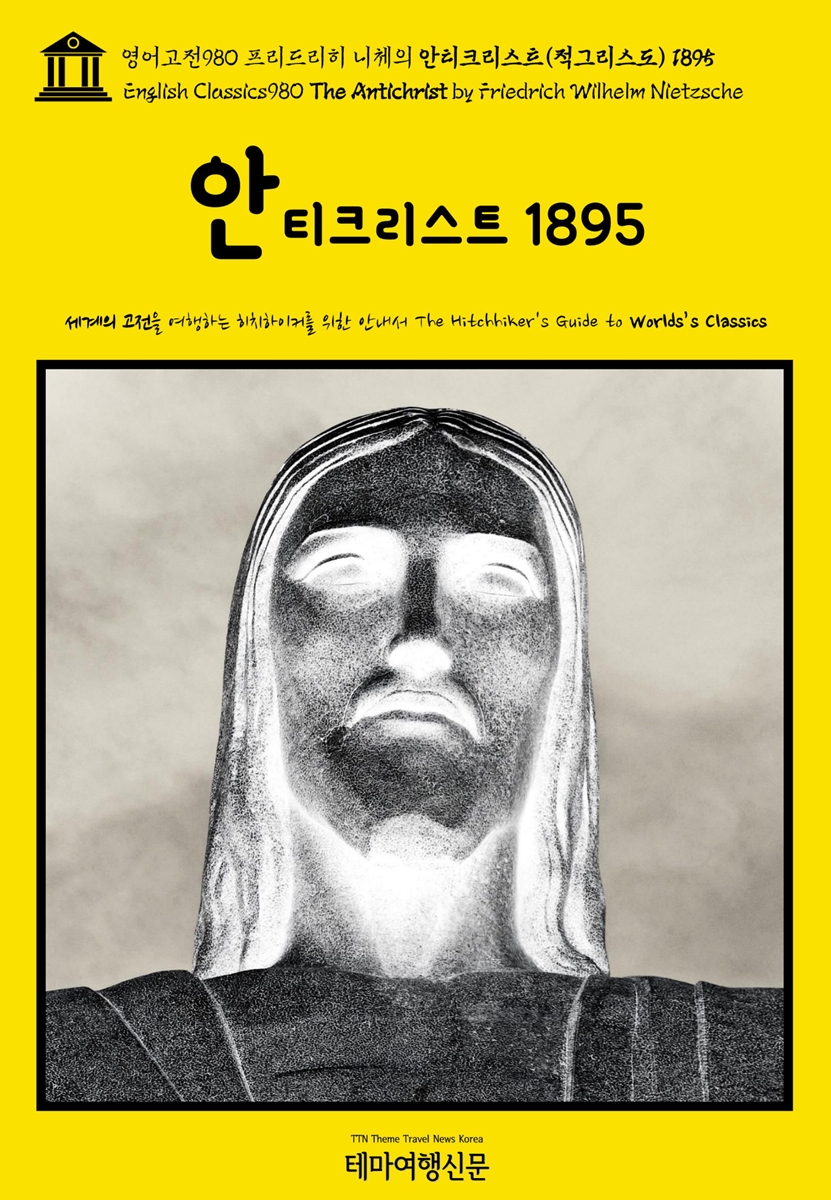▶ 프리드리히 니체의 안티크리스트(적그리스도) 1895(The Antichrist by Friedrich Wilhelm Nietzsche)는 프리드리히 니체(Friedrich Wilhelm Nietzsche, 1844~1900)가 1889년 정신병원에 입원하기 직전 해인 1888년 집필한 작품으로 차라투스트라는 이렇게 말했다 1883(Thus Spake Zarathustra: A Book for All and None), 선악의 저편 1886(Beyond Good and Evil), 도덕의 계보 1887(The Genealogy of Morals), 우상의 황혼 1889(The Twilight of the Idols) 등과 함께 그의 후기 저작에 속합니다. 니체는 1888년에만 바그너의 경우(The Case of Wagner)부터 우상의 황혼(The Twilight of the Idols)과 안티크리스트(적그리스도)(The Antichrist)까지 세 권의 저서를 집필하며, 현재까지도 불타오르는 철학의 열정을 찬란하게 피워 올렸습니다. 테마여행신문 TTN Korea 영어고전(English Classics)과 함께 어제도, 오늘도, 내일도 멋진 문학여행을! B
▶ 니체는 안티크리스트(적그리스도) 1895 이전에도 도덕의 계보 1887, 우상의 황혼 1889 등을 통해 기독교와 기독교적 가치에 대해 비판적인 입장을 지속적으로 표출해 왔습니다. 이번 작품에서는 책 제목에서부터 미루어 짐작할 수 있듯 기독교를 중심으로 철학자 이마누엘 칸트(Immanuel Kant, 1724~1804), 유대교, 사제, 성경, 고대 인도의 마누법전(the Code of Manu) 등 구체적인 사례를 들어 총 62절의 분량으로 조목조목 비판하였습니다. 한국의 독자에게는 동양의 종교인 불교(제20절~제23절)와 대조하는 대목이 인상적일 것입니다.
▶ PREFACE. This book belongs to the most rare of men. Perhaps not one of them is yet alive. It is possible that they may be among those who understand my “Zarathustra”: how could I confound myself with those who are now sprouting ears??First the day after tomorrow must come for me. Some men are born posthumously. ▷ 서문. 이 책은 가장 희귀한 사람들의 것입니다. 아마도 그들 중 한 명도 아직 살아있지 않을 것입니다. 그들이 나의 "차라투스트라"를 이해하는 사람들 중 하나일 수도 있습니다. 어떻게 내가 지금 이삭이 돋아나는 사람들과 혼동할 수 있을까요??먼저 모레가 저를 위해 와야 합니다. 어떤 사람들은 사후에 태어납니다.
▶ 5. We should not deck out and embellish Christianity: it has waged a war to the death against this higher type of man, it has put all the deepest instincts of this type under its ban, it has developed its concept of evil, of the Evil One himself, out of these instincts?the strong man as the typical reprobate, the “outcast among men.” Christianity has taken the part of all the weak, the low, the botched; it has made an ideal out of antagonism to all the self-preservative instincts of sound life;
▷ 제5절. 우리는 기독교를 치장하거나 미화해서는 안 됩니다. 기독교는 이 더 높은 유형의 인간에 대해 죽음에 이르는 전쟁을 벌였고, 이러한 유형의 모든 가장 깊은 본능을 금지했으며, 악에 대한 개념을 발전시켰습니다. 악한 자 자신, 이러한 본능에서 나온 전형적인 버림받은 자, "사람들 사이에서 버림받은 자"로서의 강한 자. 기독교는 모든 약자, 천한 자, 병든 자의 편을 들었습니다. 건전한 삶의 모든 자기 보존 본능에 대한 적대감에서 이상을 만들었습니다.
▶ 15. Under Christianity neither morality nor religion has any point of contact with actuality. It offers purely imaginary causes (“God,” “soul,” “ego,” “spirit,” “free will”?or even “unfree”), and purely imaginary effects (“sin,” “salvation,” “grace,” “punishment,” “forgiveness of sins”). ▷ 제15절. 기독교에서는 도덕이나 종교가 현실과 접촉하는 지점이 없습니다. 그것은 순수하게 상상의 원인("신," 영혼," 자아," 정신," 자유 의지," 심지어 "자유롭지 않은")과 순수하게 상상의 효과("죄," 구원," 은혜," 처벌,"죄의 용서")를 제공합니다.
▶ 23. Buddhism, I repeat, is a hundred times more austere, more honest, more objective. It no longer has to justify its pains, its susceptibility to suffering, by interpreting these things in terms of sin?it simply says, as it simply thinks, “I suffer.” To the barbarian, however, suffering in itself is scarcely understandable: what he needs, first of all, is an explanation as to why he suffers. (His mere instinct prompts him to deny his suffering altogether, or to endure it in silence.)
▷ 제23절. 거듭 말하지만 불교는 백배는 더 엄격하고, 더 정직하고, 더 객관적입니다. 그것은 더 이상 이러한 것들을 죄의 관점에서 해석함으로써 자신의 고통과 고통에 대한 감수성을 정당화할 필요가 없습니다. 그러나 야만인에게 고통 그 자체는 거의 이해할 수 없습니다. 그가 필요로 하는 것은 무엇보다도 그가 고통 받는 이유에 대한 설명입니다. (그의 순전한 본능은 그로 하여금 자신의 고통을 완전히 부인하거나 조용히 견디도록 자극합니다.)
▶ 56. ?In the last analysis it comes to this: what is the end of lying? The fact that, in Christianity, “holy” ends are not visible is my objection to the means it employs. Only bad ends appear: the poisoning, the calumniation, the denial of life, the despising of the body, the degradation and self-contamination of man by the concept of sin?therefore, its means are also bad.?I have a contrary feeling when I read the Code of Manu, an incomparably more intellectual and superior work, which it would be a sin against the intelligence to so much as name in the same breath with the Bible.
▷ 제56절. 마지막으로 분석하면 다음과 같습니다. 거짓말의 끝은 무엇입니까? 기독교에서 "거룩한" 목적이 보이지 않는다는 사실은 그것이 사용하는 수단에 대한 나의 반대입니다. 독살, 비방, 삶의 부정, 신체 경멸, 죄라는 관념에 의한 인간의 타락과 자기 오염?그러므로 그 수단도 나쁘다.?나에게는 반대되는 느낌이 듭니다. 비교할 수 없을 정도로 지적이고 뛰어난 작품인 마누의 법전을 읽었을 때, 그것을 성경과 함께 이름을 붙이는 것은 지능에 반하는 죄가 될 것입니다.






